Equity, Diversity and Inclusion Reflection of Health Sciences
Health Sciences Office of Equity, Diversity and Inclusion supports dozens of programs and events with the goal of increasing health care equity for all.
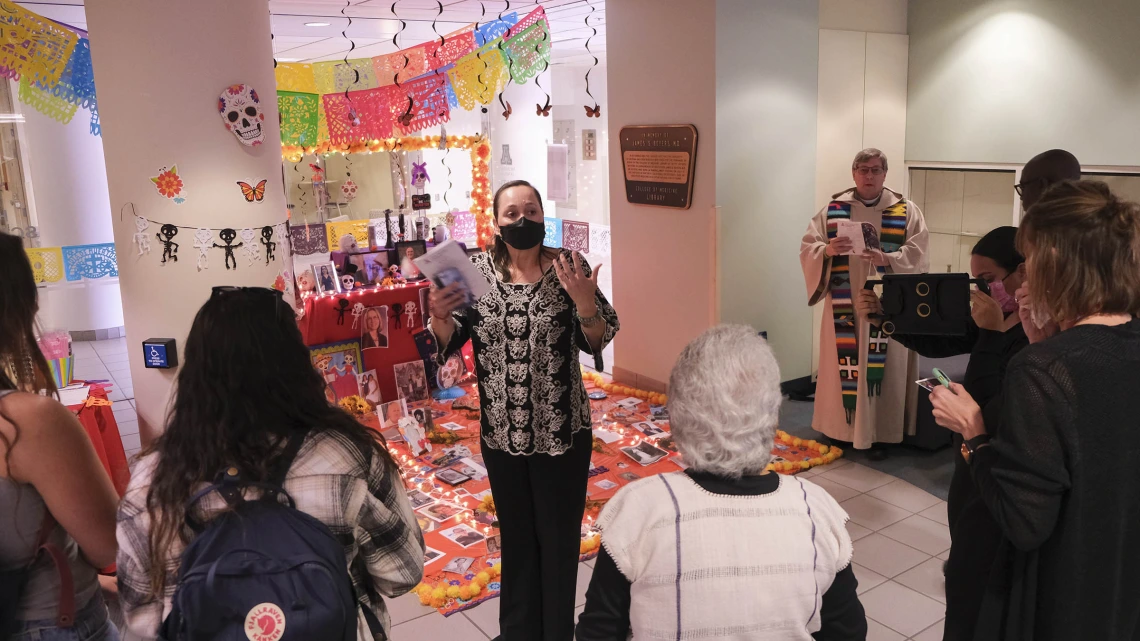
Lydia Kennedy (center), senior director of the UArizona Health Sciences Office of Equity, Diversity and Inclusion, speaks to about 75 attendees at the annual Dia de Los Muertos blessing ceremony in the Health Sciences Library. The altar behind her is filled with photos and remembrences from Health Sciences faculty, staff and students.
While the University of Arizona is known for making giant mirrors to look out into space, including some on the James Webb telescope, the UArizona Health Sciences Office of Equity, Diversity and Inclusion (OEDI) turns a figurative mirror to UArizona Health Sciences students, faculty and staff to make sure they reflect the communities they serve in southern Arizona and the Southwest.
The mission of the Health Sciences OEDI, which was formed in 2015, is to help UArizona Health Sciences colleges and centers increase workforce diversity, expand knowledge of and sensitivity to social and cultural factors that influence health and health care, and foster a workplace climate of inclusion and belonging.
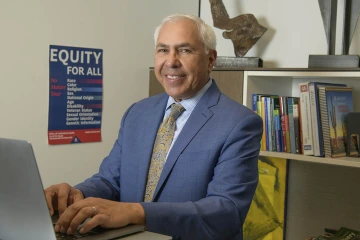
Francisco A. Moreno, MD, has been the associate vice president for equity, diversity and inclusion at UArizona Health Sciences since 2015. He was recently appointed interim vice president and chief inclusion officer for the University of Arizona.
Health Sciences OEDI hosted more than 40 events for faculty, staff and students during fiscal year 2021-22. In partnership with the five UArizona Health Sciences colleges, the office offers several programs for students of all levels, from high school to those pursuing advanced medical degrees. These programs support students from economically and educationally disadvantaged backgrounds in pursuing education and careers as researchers and health care professionals.
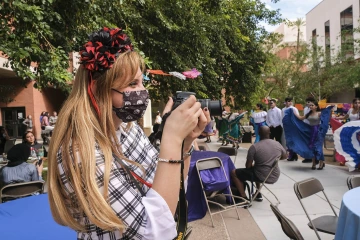
“I enjoy seeing through the camera lens how I get to be part of creating health equity, while connecting with the Health Sciences community and being able to share what I capture via our marketing outlets,” said Elisa Lopez, marketing and communications specialist in the UArizona Health Sciences Office of Equity, Diversity and Inclusion.
“We share knowledge and education of different cultures to increase cultural sensitivity and cultural intelligence in health care,” explained Lydia Kennedy, senior director of the UArizona Health Sciences Office of Equity, Diversity and Inclusion. “We attract historically excluded groups and LGBTQIA+ with a focus on eliminating health disparities and creating health equity for all.”
To build a pipeline of diverse students entering research and health care professions, OEDI hosts five structured summer programs including: Med-Start, a six-week summer academic enrichment program focused on improving access to information and resources for high school juniors interested in health care professions; Border Latino and American Indian Summer Exposure to Research (BLAISER), which addresses health disparities in Arizona’s ethnically diverse communities; and a summer internship program for undergraduate and graduate students called Focusing Research on the Border Area (FRONTERA), providing hands-on research on public health disparities in the U.S. and Mexico border region.
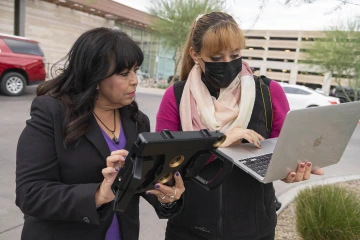
(From left) Alma Aguirre, program coordinator for Med-Start and Lopez prepare to livestream the Veterans Day flag raising ceremony.
FACES Conversantes provides bilingual Spanish-speaking pre-med students with training and volunteer opportunities as medical interpreters in health care facilities in southern Arizona. The bilingual distinction track is designed to enhance the medical communication skills of students who have intermediate to advanced proficiency levels in Spanish with the goal of graduating physicians who are competent to work as bilingual health care providers.
“The medical Spanish programming empowers bilingual students at different stages of their training to continue their education by offering elective and credit-bearing classes,” said Alejandra Zapien-Hidalgo, MD, MPH, director of Bilingual Medical Spanish and assistant professor in Family and Community Medicine at the College of Medicine – Tucson. “It is important to show our students, early on their career, the positive impact they can have in our community.”
Attracting and supporting a diverse faculty, staff and student cohort is only part of the mission. Through their lecture series, cultural events and training, the OEDI team strives to not only bring an awareness of equity, diversity and inclusion to the UArizona Health Sciences community, but also to make everyone an active participant in integrating these tenants into every aspect of their roles as faculty, staff and students.
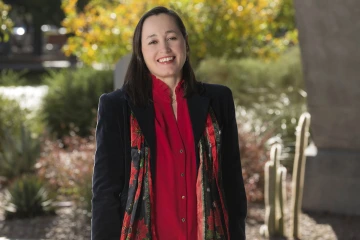
“In health care, we are in the business of healing, and it’s vital we have policies, procedures and systems that support all who aspire, work and are treated in health care as human beings with the best possible outcome,” said Lydia Kennedy, senior director of the UArizona Health Sciences Office of Equity, Diversity and Inclusion.
Health Sciences OEDI also has a mental health counselor on staff, Jenna Teso, DBH, LCSW, who operates a Program for Mental Health Wellness, providing free counseling services to Health Sciences students as well as mental wellness workshops and trainings. The program provides services that address the unique needs of Health Sciences students and promotes diversity, inclusion and mental health wellness.
In OEDI’s 2021-2022 fiscal year report, Michael D. Dake, MD, senior vice president for the University of Arizona Health Sciences, emphasized his commitment to promoting health equity and addressing the needs of underserved communities through increasing the diversity of health care professionals and creating the next generation of compassionate and culturally sensitive care providers.
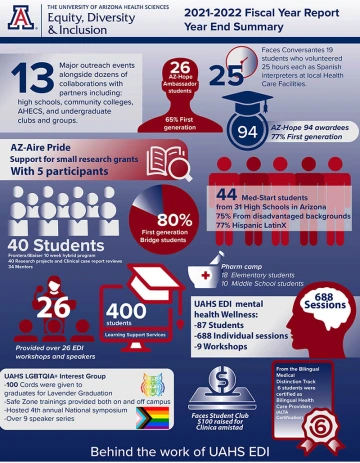
Click to enlarge the Health Sciences Office of Equity, Diversity and Inclusion end of year summary graphic.
OEDI staff say that fostering an environment of equity, diversity, inclusion, justice and belonging isn’t just their mission, it is the responsibility of everyone at UArizona Health Sciences.
“We are here to support everybody’s efforts towards equity, diversity and inclusion,” Dr. Moreno said. “We’re just a group of folks leveraging the generosity and commitment of faculty, students and community members who are contributing to the larger mission. This is everybody’s work.”

